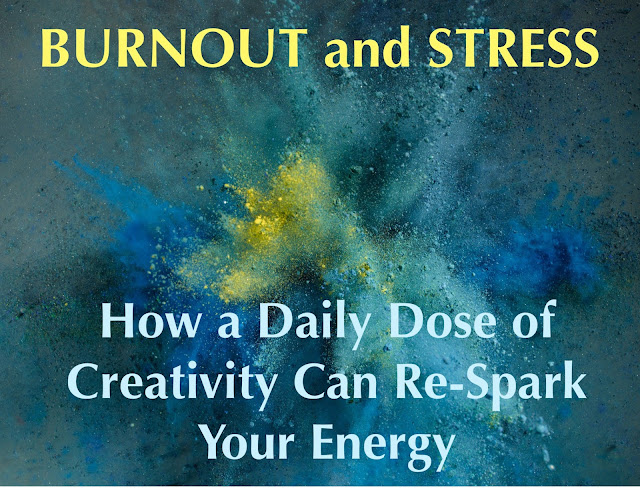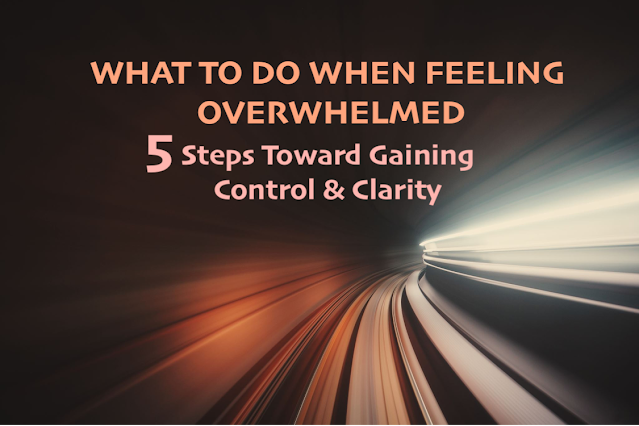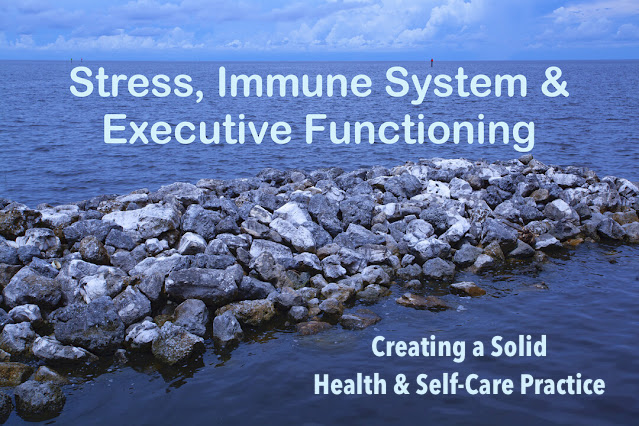BURNOUT and STRESS: How a Daily Dose of Creativity Can Re-Spark Your Energy
Presently, amidst a protracted global health pandemic, healthcare workers are experiencing unprecedented levels of physical and mental exhaustion. The rates of self-reported symptoms of anxiety and depression are accelerating.
According to recent data published by Mental Health America (MHA), responses collected from 1119 healthcare workers indicate that a staggering 76% reported exhaustion and burnout. Additionally, clinical researchers, Rebecca Hendrickson and Katherine Hoerster at VA Puget Sound Health Care System at the University of Washington School of Medicine reported that in a survey of more than 500 healthcare workers and first responders, a substantial majority reported experiencing clinically significant psychiatric complaints such as depression (74%) and anxiety (75%). According to estimates from the Bureau of Labor Statistics, the U.S healthcare sector has lost nearly half a million workers since February 2020. These figures are disconcerting.
WHAT IS BURNOUT?
The coining of the term "burnout" from a clinical perspective is largely attributed to American psychologist, Herbert Freudenberger, who in 1974 described it as the outcome of severe stress in "helping" professionals. Over time, the term "burnout" has generalized to other professions and is no longer restricted to those in the healing arts. Employees at all levels and across domains are reporting feeling on edge.
Burnout, in and of itself, is not a disease but more of a cluster of symptoms emanating from a culmination of stress and dysfunction that, over time, silently and insidiously lead to feelings of irritability, anxiety and depression.
The effects of prolonged, unchecked stress include many health problems such as hypertension, heart disease, diabetes, and increased susceptibility to infections. Add cognitive concerns such as foggy thinking and memory problems to the list and the result is suboptimal functioning. Since the brain, and the nervous and immune systems are linked, the long-standing exposure to chronic and unrelenting stress wreaks havoc on our mental and physical well-being, and eventually our immune system.
- energy exhaustion
- workplace disconnection
- reduced productivity
Those affected will start to question whether their efforts are making a difference, leading to the atrophying of motivation and productivity.
While occasional stress and anxiety are normal parts of life, persistent and uncontrollable levels eventually become disabling. Stress is meant to be temporary. Following a stressful occurrence or period, the body returns to a natural state. The heart rate slows, the muscles relax, and breathing returns to normal. It is the heaviness of chronic stress that increases the likelihood of poor health and an overall poor outcome; that far exceeds one's work life.
This article will address interventions one can do on an individual basis and not within the corporate or organizational realm; keeping in mind that for true change to occur to mitigate burnout's serious consequences, it will need to be addressed on a multifaceted level. The responsibility to cope with the effects of workplace stress and in some instances, dysfunction, cannot be solely placed on the shoulders of the employees. True change requires a healthy workplace milieu, as our environments help to shape our health.
The feeling of burnout has reached alarming proportions, fueled by the cumulative effects of the pandemic and other stressors.
 |
THE ROLE OF EPIGENETICS
Whereas we're all familiar with the role genes play in our health, we must also pay respect to the role behaviors and our environment affect our overall well-being. Epigenetics is the study of how behaviors and environment affect and change the way our genes express themselves. In contrast to genetic alterations, epigenetic changes are reversible and they do not affect the DNA sequence. However, they can change how our bodies read the sequence. They turn genes "on" and "off." Acts of self-care affect how our bodies react to stress.
Everyday brings new evidence that the mind-body connection reaches right down to the activities of our genes. How this activity changes in response to our life experience is referred to as "epigenetic." Regardless of the nature of the genes we inherit from our parents, dynamic change at this level allows us almost unlimited influence on our fate.
-Deepak Chopra, MD and Rudolph Tanzi, MD
GETTING SERIOUS ABOUT SELF-CARE
Anything you do to keep yourself healthy and energized is self-care. This includes seeking professional guidance in situations in which an anxiety and/or depressive disorder (among others) affect the quality of your everyday life and overall functioning. Helpful suggestions that include meditation, exercise, and engaging in a hobby are not in lieu of seeking quality medical attention but are included as a "wholistic" approach to your self-care regimen.
While few would disagree the importance of self-care, it is unfortunately not prioritized in our lives. When stressed, it is the first to go. Engaging in a self-care routine has been clinically shown to reduce stress and anxiety, improve focus and concentration, minimize feelings of frustration, irritability, and depression, and improve energy and immune functioning. When your brain's frontal lobes' executive processes are free to coordinate their intricate functions, your life will be experienced as energized and balanced.
One of the most self-less commitments you can make is to commit, unapologetically, to your own well-being and self-care.
Helpful self-care suggestions to incorporate into your routine include:
 |
When burnout hits, you will need a plan of action to cope.
The insidious effects of burnout result in veering you further away from yourself and your purpose. Over time, you will not even recognize the person you're becoming as you drown in a cascade of stress hormones and feelings of purposeless living.
Time to return to the self!
YOURSELF
Your TRUE self
THE PRESCRIPTION?
 LET'S GET CREATIVE
LET'S GET CREATIVE
Creativity is the transformation of an idea into reality, and is the energy behind the inspiration that turns our personal, internal light on.
Creativity is self-expression in motion.
It is weaved within us, incorporating a dynamic and innovative part of our being that helps bring fulfillment and meaning to our lives. Some of us connect more deeply with it than others. However, when stressed (as with self-care), we typically do not gravitate toward productive solutions. Rather than to engage, stepping forth into creativity, we often disengage, stepping backward into over-eating, drinking, thinking, and any other over that does not support the life we are desiring. Participating in a creative activity promotes feelings of relaxation as it reduces levels of the stress hormone, cortisol.
The Zone Of Mindfulness
Immersing yourself in a creative activity will place you and your brain directly in the zone or flow state, which is a coveted location. You cannot be both anxious and in the zone simultaneously. The zone provides a vacation from stress. Coined by psychologist, Mihaly Csikszentmihalyi, who described this feeling as a highly focused mental state. During the flow state, your brain releases a cascade of neurotransmitters such as norepinephrine, dopamine, endorphins and serotonin that produce pleasure and deep focus; both are high contributors of creativity and the creative process. Getting into the zone is a great way to practice mindfulness since the zone represents a deep connection with being in the here and now.
Mindfulness is the act of paying attention to the present moment with a non-judgmental attitude. In essence, mindfulness is the basic human ability to become fully present, without feelings of overwhelm or over-reactivity. In our busy worlds, where multi-tasking has become synonymous with efficiency and productivity, we find ourselves buried under the pressures of a never ending To-Do list and time constraints that create a dysregulated and unbalanced life. Combining mindfulness with creativity is your direct pathway to entering the zone; the place of deep calm within your brain.
Hobbies and activities that enhance creativity include but are certainly not limited to just the ones outlined below:
The Eureka Effect
A creative mind is not just limited to artists but is also an integral part of other fields, such as science and technology. To solve a difficult problem, a new perspective is often needed. A conscientious effort to connect with and expand creativity will lead to greater clarity; to seeing the big picture. You will access a panoramic view of the important areas of your life.
Creativity coupled with daydreaming can give rise to the much appreciated Eureka Effect, also known as the Aha! Moment. All of a sudden, a new understanding or solution emerges. You finally get something that you couldn't see before. How wonderful would it be if most of our problems were solved this way?
The information presented in this blog is intended for general knowledge and is not a substitute for medical advice or treatment. As with most things in life, there isn't a magic pill or "cure-all" but there are strategies to regain control of your life and your health. Awareness and acknowledgment of feelings of burnout are good first steps. Do not hesitate to reach out for support. This could be a friend, family member, co-worker, clergy and/or mental health professional. It is through validation and connection that we feel heard and understood. Although socially distancing, we should not be feeling emotionally disconnected, from either ourselves or others.
REFERENCES
https://mhanational.org/mental-health-healthcare-workers-covid-19
Hendrickson, R.C., Slevin, R.A., Hoerster, K.D. et al. The Impact of the COVID-19 Pandemic on Mental Health, Occupational Functioning, and Professional Retention Among Health Care Workers and First Responders. J GEN INTERN MED (2021). https://doi.org/10.1007/s11606-021-07252-z
https://www.beckershospitalreview.com/workforce/about-1-in-5-healthcare-workers-have-left-medicine-since-the-pandemic-began-here-s-why.html
















Comments
Post a Comment